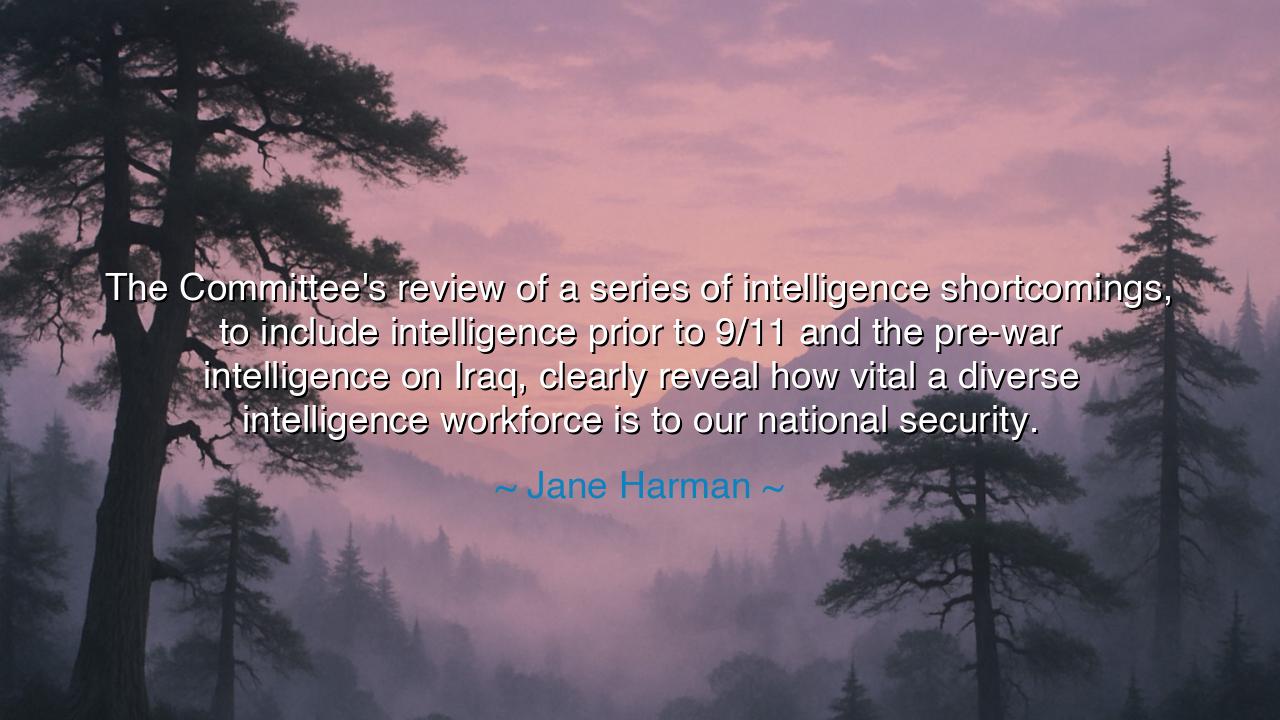
The Committee's review of a series of intelligence shortcomings
The Committee's review of a series of intelligence shortcomings, to include intelligence prior to 9/11 and the pre-war intelligence on Iraq, clearly reveal how vital a diverse intelligence workforce is to our national security.






“The Committee's review of a series of intelligence shortcomings, to include intelligence prior to 9/11 and the pre-war intelligence on Iraq, clearly reveal how vital a diverse intelligence workforce is to our national security.” — Jane Harman
In these words, Jane Harman, a guardian of the republic and a steward of oversight, speaks a truth that reaches beyond the chambers of government — a truth as old as civilization itself: that wisdom thrives in diversity, and that the safety of a nation depends not on strength alone, but on the breadth of understanding within those who protect it. Her reflection arises from moments of tragedy and error, from the intelligence failures that marked the early years of the twenty-first century — the missed warnings before the towers fell, and the flawed judgments that led to war in Iraq. From these events came a lesson carved in pain and blood: that when thought grows narrow, perception fails, and even mighty nations stumble.
The origin of this quote lies in the investigations of the United States Congress, which sought to understand how two great failures — the attacks of September 11, 2001, and the pre-war intelligence on Iraq — had occurred despite the world’s most powerful intelligence agencies. What they found was not a lack of effort or courage, but a lack of diversity of perspective. Analysts thought too similarly, their assumptions unchallenged, their worldviews too narrow. The warnings of a few were drowned out by the chorus of the many who saw only what they expected to see. Thus, the machinery of intelligence failed, not from weakness, but from uniformity — from the peril of a single lens through which the complex truth was viewed.
The ancients, too, warned of this peril. In the councils of the Roman Republic, the great orator Cicero once declared that a wise senate must “hear all voices, lest the truth be buried beneath agreement.” Rome learned, often too late, that the absence of dissent is not a sign of unity, but of blindness. Empires fall not because they lack power, but because they lack perspective. So it was in the modern age: the tragedy of 9/11 and the misjudgment of Iraq both revealed what happens when intelligence — the very shield of a nation — is deprived of diverse minds to interpret the ever-shifting patterns of the world.
To be diverse in intelligence is not merely to gather men and women of different faces and origins; it is to gather different ways of seeing, thinking, and questioning. The strength of a watchtower lies not in how high it stands, but in how many directions it can look. A single view of the world cannot perceive every danger; a single culture of thought cannot anticipate every enemy. The diverse intelligence workforce that Harman calls for is a living embodiment of wisdom itself — a mosaic of insight where the warrior’s instinct meets the scholar’s caution, where the skeptic tempers the zealot, and where truth emerges from the balance of differences.
This lesson, though born of nations, belongs also to every life. Each person must build their own inner intelligence community, gathering many perspectives within their heart. The one who listens only to themselves will be deceived; the one who surrounds themselves only with agreement will walk into ruin. Just as a nation must value diversity to safeguard its security, so too must the soul value it to safeguard its integrity. Listen to those unlike yourself, seek the opinions that unsettle you, and learn from the wisdom that challenges your certainty. For only by welcoming difference can we perceive the full scope of truth.
Thus, Jane Harman’s words echo through the ages as a call to vigilance — not only against enemies abroad, but against blindness within. National security, she reminds us, is not merely a fortress of arms and walls, but a fortress of minds — minds open, varied, and courageous enough to question one another. When those who guard the peace think alike, they see little. When they think differently, they see much. And in that breadth of sight lies the strength of nations and the endurance of peace.
So remember this, O seekers of wisdom: diversity is not weakness — it is the mother of discernment. In councils of state, in companies, in families, in every endeavor where truth must be found, cherish the voices that differ from your own. Build your table wide and fill it with many minds. For in the harmony of difference lies security, and in the unity of understanding lies power. This is the teaching of Jane Harman’s words — that diverse thought is the truest defense, and that only when we see with many eyes may we guard what we love with clarity and strength.






AAdministratorAdministrator
Welcome, honored guests. Please leave a comment, we will respond soon